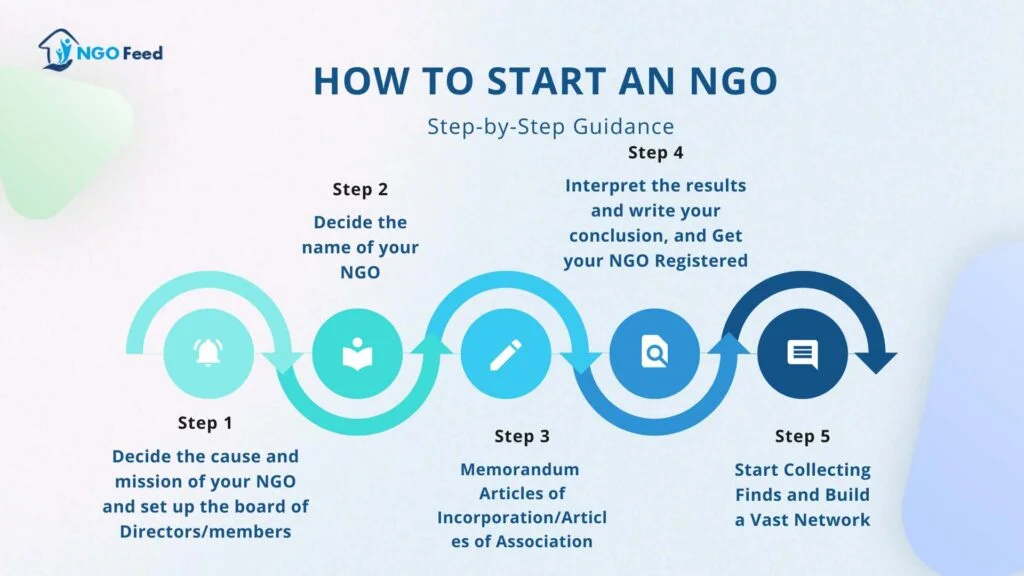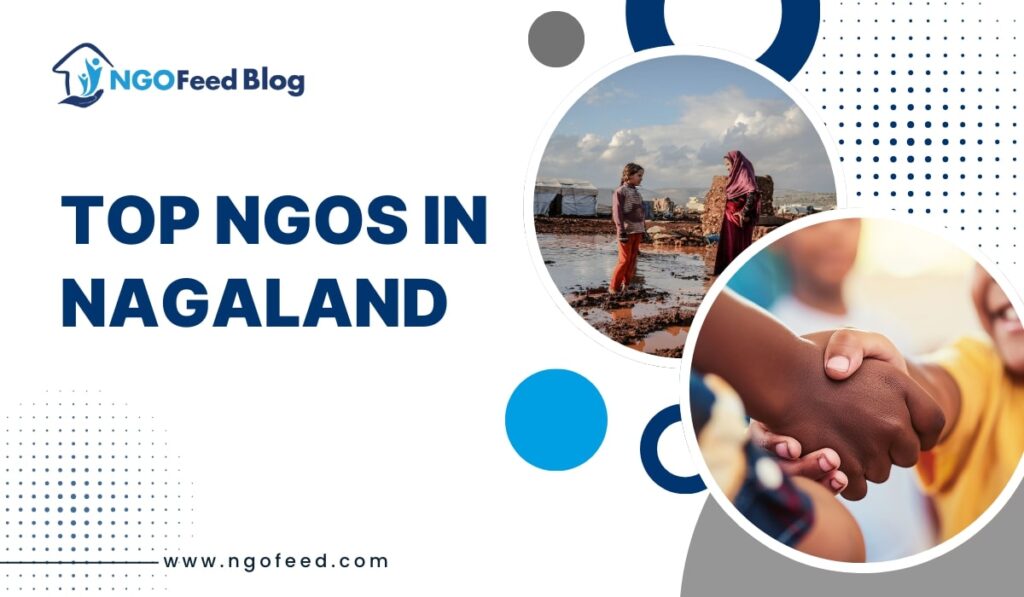Top NGO in Nagaland: Nagaland is a state located in the northeastern part of India. Several nonprofits work hard for various categories to live a better society. Nagaland, like many other Indian union territories, has several non-governmental organisations (NGOs) working in multiple fields, including education, health, the environment, human rights, and rural development.
Several NGOs in India have developed and strengthened through their good works in the last few decades. However, only a few have impacted Society, and some are still working hard and serving the community. Some top NGOs in Nagaland have reached a level, and some want to go where the Indian Society has seen their efforts. Despite being surrounded by all the troubles prevailing in our nation, it lacks transparency or the rate of corruption.
This article provides comprehensive information about the Top NGO in Nagaland and how they positively impact Society by doing outstanding work in India. You can check the information about the Best NGO in Nagaland and some information about the NGO, such as whether it is a nonprofit, how to start an NGO, the procedure, etc.
Table of Contents
What is NGO?
Before starting a complete article review, let’s first understand an NGO. An NGO is a non-governmental organisation in which the government has no role. People who have good money or business help people through NGOs. NGOs are a subgroup of organisations established by citizens, including clubs and associations that provide services to their members and others—an organisation aimed at the welfare of society. NGOs do much social work, such as housing widowed women, teaching poor orphans, protecting women, etc.
Role of NGOs in India
In this section, we provide detailed information about the Role of NGOs; you can check the table below.
- Particular Description: Advocacy for and with the Poor NGOs can act as spokespeople for low-income people, attempting to influence government policies and programmes. This can be accomplished through various methods, including demonstration and pilot projects, public forum engagement, government policy and strategies, and dissemination of research findings and impoverished case studies.
- Bridging the Gap: Non-governmental organizations (NGOs) work to fill in gaps in government programmes and reach out to those typically overlooked by government projects.
- Research and Development: These non-governmental organizations (NGOs) do research and assist in advancing knowledge on current topics. They come up with creative solutions to social problems based on research.
- Acts as a Middleman: It is a nonprofit venture that acts as a middleman and is not under the control of any governmental body. Its goal is to improve the welfare of citizens. Individual needs are assessed by NGOs, which operate as a middleman between Society and the government. They are respected globally because they seek aid in the financial sector and many economic, social, and political structures.
- Empowering women: NGOs take a stand against gender-based discrimination through our advocacy and initiatives. Together, we can create a world where everyone is treated fairly and respectfully, regardless of gender.
Also Read: Role of NGOs in Education
Top NGO in Nagaland 2025
Many excellent top NGO in Nagaland work in various areas such as education, healthcare, women’s empowerment, child rights, environmental conservation, old age, orphanage homes, food, and more. NGOFeed has been working for NGOs for a long time and provides research-based information on them. We have prepared a list of genuine NGOs in Nagaland that work hard to improve our society. Our list of famous NGOs in Nagaland is based on our team’s research and work. In this section, we provide a list of the top NGO in Nagaland, a short overview of the nonprofit organizations in a table format, and some statistics on how they have helped those in need.
4. Development Association Of Nagaland
It is a not-for-profit, non-government, voluntary society that works for the integral development of the people of Nagaland without distinction of creed, race, or religious affiliation. The NGO was registered in 1985 under the Societies Registration Act section XXI of 1860 as amended via the Registration of Societies (Nagaland First Amendment) Act, 1969.
The association works in partnership with its 35 parish councils and 21 health centres, including 11 districts in the Nagaland State, helping them know program intervention areas on a priority basis through planning, implementation, animation, and monitoring resource mobilization.
| Name | Development Association Of Nagaland |
| Types of Registration | Not-For-Profit |
| Founded | 1985 |
| Founder | Dr James Thoppil |
| Area of Work | We Work in the field of Education, employment, livelihoods, health and empowerment of vulnerable sections of society. |
| Official Website | www.developmentassociationofnagaland.org |
| Address | Carmel HSS Campus, Chekiye Village, 4th Mile, Dimapur, Nagaland |
| Contact Details | directoratedan@yahoo.com |
Also Read: How Social Media in Amplifying Social Causes
3. YouthNet
It is a non-profit organization that supports youth in acquiring knowledge, developing life skills and forming attitudes to become positive, self-directing, responsible, productive, and contributing members of society through active participation and involvement. It is registered under the Registration of Societies Act 1860, and it was launched on the 1st of February 2006 by a group of young Naga professionals.
It remains one of the premier youth organizations in North East India that empowers young people to be unemployed and addresses Education, livelihood issues and entrepreneurship. YouthNet is a non-profit organization that aims to assist young people in gaining knowledge, developing life skills, and forming positive attitudes, allowing them to become self-directed, productive, responsible, and contributing members of society through active participation and involvement. YouthNet is registered under the Registration of Societies Act 1860.
| Name | YouthNet |
| Types of Registration | Non-Profit organization |
| Founded | 2006 |
| Founder | Hekani Jakhalu |
| Area of Work | We Work on education, unemployment, entrepreneurship and livelihood issues. |
| Official Website | www.youthnet.org.in |
| Address | Billy Graham Road, Near Kohima College, Kohima, Nagaland |
| Contact Details | youthnet1@gmail.com |
2. Peace Channel
It is an emerging secular youth peace movement of the 3rd millennium aiming to transform individuals into peacemakers, promoters, and lovers. It concentrates on improving the culture of violence irrespective of tribe, the culture of peace, caste, region, class, or religion. Now, the movement has a transformative presence in Nagaland and some states. The Peace Channel is a new secular youth peace movement of the 21st century that aims to transform individuals into peace lovers, makers, and promoters.
Its goal is to shift the culture from one of violence to one of peace, regardless of tribe, caste, class, region, or religion. The movement has implemented more than 4000 peace programs, and provided training to over 2850 teachers, youth, women, religious and community leaders, and more than 150000 children in both rural and urban settings. The training focuses on building peace and resolving conflicts.
Also Read: Cybersecurity for NGOs
| Name | Peace Channel |
| Types of Registration | Non-Governmental Organization |
| Founded | 1989 |
| Founder | Rev. Fr. C P Anto |
| Area of Work | It focuses on transforming the culture of violence into a culture of peace, irrespective of tribe, caste, class, region, or religion. |
| Official Website | www.peacechannel.in |
| Address | Circular Rd, Lumding New Colony, Forest Colony, Dimapur, Nagaland 797113 |
| Contact Details | peacechannel05@gmail.com |
1. Youth Mission
The NOG was established by Rev. Dr T. Nyekha, a non-governmental organization that has been providing addiction treatment services and awareness since 1989. It has been at the forefront of India’s fight against addiction. Over the years, the NGO has placed itself among the most successful rehabs in India and our reputation is backed by our proven recovery rates. Youth Mission Addiction Recovery Program is unique as we offer a holistic, spiritual, physical, and psychological recovery program.
Our proven Recovery Programs will give you the skills to Overcome Your Addiction and enable you to lead a happier, healthier life.
| Name | Youth Mission |
| Types of Registration | Non-Governmental Organization |
| Founded | 1989 |
| Founder | Rev. Dr T. Nyekha |
| Area of Work | We provide Addiction Treatment Services and Awareness |
| Official Website | www.youthmission.in |
| Address | Youth Mission, Sekhazou-DBS Circular Road, Zogadzu Colony, Kohima, Nagaland, India. |
| Contact Details | tnyekha@gmail.com |
Also Read: The Power of User Generated Content for Nonprofit
How to Start an NGO?
Before starting an NGO, you should know the fundamental problems of people in the area you want to reduce. Knowing this, it becomes easier to formulate the purpose and mission of your NGO accordingly. After this, you must decide the NGO’s vision, mission and purpose.
People with problems must work accordingly because no one listens to many people’s concerns. Therefore, the purpose of any NGO should be to understand the people’s problems and start their NGO accordingly.
Steps to quickly start an NGO in India:
Here, we provide information about starting an NGO and follow these easy steps. Let’s see.

NOTE: Do you want to know how to start an NGO?
How to Register an NGO?
The NGO registration process takes place in three ways. We can also say that NGOs can be registered in any of the three Acts. Let us know what these three acts are.
- Trust Act (Charitable Trust Registration Process)
- Society Act (Society Registration Process in India)
- Companies Act (Section 8 Company Registration)
Frequently Asked Questions (FAQs)
What exactly is a non-governmental organization (NGO)?
An NGO is a non-profit organization that works for a social cause. It is a non-profit organization.
How are non-governmental organizations funded?
Non-governmental groups are sponsored in a variety of ways. Individuals, foundations, businesses, and governments are funding sources for non-governmental organizations.
Is it difficult to form a non-profit organization (NGO)?
No, but the following criteria determine the amount of difficulty: 1) the founders’ or founding entity’s experience and history; 2) the local community’s need for another NPO (your Country and state have special rules for NPO creation and operation, so that they will differ), and 3) the local community’s need for another NPO.
What can I contribute to an NGO?
You locate the appropriate Ngo and donate. Hundreds of worthy causes are vying for your money. All you have to do now is figure out what your priorities are.

